

Discover more from Israel from the Inside with Daniel Gordis
What the Hanukkah war was really about
And why it's time to fight it again, though with a twist ...
Welcome to Hanukkah, the Jewish celebration of war.
Sound crazy? Apologies if the notion of Hanukkah as the celebration of war sullies the spinning of dreidels or the eating of “chocolate coins.” But yes, that is what Hanukkah is. It’s the celebration of a war between a band of Jewish religious zealots under the leadership of Judah the Maccabee and Greeks (and other Jews) who were trying to Hellenize this region.
Truth is, Jews have been arguing for a long time about precisely what it is that Hanukkah celebrates. The Talmud, in Tractate Shabbat, tells the story that we were all taught as kids:
What is Hanukkah, and why are lights kindled on Hanukkah? The Sages taught: On the twenty-fifth of Kislev, the days of Hanukkah are eight. … What is the reason? When the Greeks entered the Sanctuary they defiled all the oils that were in the Sanctuary by touching them. And when the Hasmonean monarchy overcame them and emerged victorious over them, they searched and found only one cruse of oil that was placed with the seal of the High Priest, undisturbed by the Greeks. And there was sufficient oil there to light the candelabrum for only one day. A miracle occurred and they lit the candelabrum from it eight days. The next year the Sages instituted those days and made them holidays …
But the extra-biblical books, Maccabees I and II, make no mention of a cruse of oil. Neither, for that matter, does the central prayer we add on Hanukkah, Al HaNissim:
In the days of Matisyahu, son of Yochanan the High Priest, the Hasmonean and his sons, when the evil Greek kingdom rose up against Your people Israel to make them forget Your Torah and to turn them away from the statutes of Your will— You, in Your abundant mercy, stood by them in their time of distress, You defended their cause, You judged their grievances, You avenged them. You delivered the mighty into the hands of the weak, many into the hands of the few, defiled people into the hands of the undefiled, the wicked into the hands of the righteous, and insolent [sinners] into the hands of diligent students of Your Torah. And You made Yourself a great and sanctified name in Your world. And for Your people, Israel, You performed a great deliverance and redemption unto this very day. Afterwards, Your sons entered the Holy of Holies of Your Abode, cleaned Your Temple, purified Your Sanctuary, and kindled lights in the Courtyards of Your Sanctuary, and designated these eight days of Chanukah to thank and praise Your great Name.
So, the Talmud says it was the miracle of the oil. The liturgy says that it was the miracle of the victory over the Greeks. And the Zionists? As we noted in last year’s column about Hanukkah, Zionists had a very distinct idea about what Hanukkah celebrates, and it was no Godly miracle.
No miracle happened for us We found no cruse of oil We dug in the rock until we bled And then there was light!
So, we disagree about the miracle of the oil. We disagree about whether there was a miracle at all. What do all the accounts agree about? It was a war.
Not just any old war, it seems. The British Jewish historian, Cecil Roth, argued that the real significance of the Maccabees lay in the fact that their rebellion against the Greeks was the first time that human beings had gone to battle to preserve an idea (as opposed to territory or wealth).
The Jews, says Roth, were the first people who believed that an idea was was worth dying for.1
That war over ideas has erupted in Israel once again. And frankly, it’s a battle long overdue.
Because Israel is (almost) at war over ideas, and because Hanukkah is, indeed, about a war over ideas, it shouldn’t surprise us that Hanukkah imagery made its way into recent debates in the Knesset.
Avi Maoz, the “proudly homophobic” head of the Noam party who will now likely be deputy minister in charge of “Jewish identity,” recently invoked Hanukkah when he took to the podium at the Knesset and declared, “We celebrate the victory that the Creator brought about through the heroism of the Maccabees against the Greeks and their collaborators - the Hellenists.”
It was one of those cringe-worthy comments that have now become daily fare from this new-government-in-waiting. And as he undoubtedly expected and hoped, this one elicited an inevitable retort. Yesh Atid's MK Michal Shir predictably shouted back, “Did you just call us Greeks or is it just me? Are we not Jewish enough for you?!”
Had Maoz then said what he really thought, though, he would have said, “No, you’re not.”
And—wait, I’ll explain this further —he wouldn’t have been entirely wrong.
Last week, the city of Tel Aviv draped a gigantic reproduction of Israel’s Declaration of Independence on City Hall. As you’ll see below, TA’s mayor, Ron Huldai, explained, “now more than ever it’s important to remember its values.”

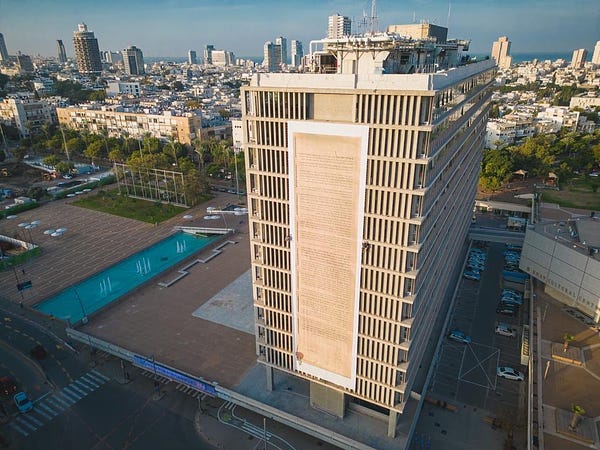
Huldai was only partially right. It is, indeed, important to discuss the values inherent in the Declaration of Independence. But “now more than ever”? It’s been critical all along—it’s just that no one has done it. We Israelis now find ourselves in the predicament that we are in, not because of the right, but because of the center and the left. For five elections in a row, the right championed a vision of an Israel deeply rooted in Jewish values, an Israel that would restore security to its citizens, an Israel that would not delude itself that being a Hebrew-speaking, falafel-eating version of some European nation-state was worth anything at all.
As that was unfolding, what was happening among the center and the left? They did two things. First, they made each of these elections a referendum on Bibi (instead of offering a vision for the country). And second, they bickered among themselves, allowing the right to slide right into power. Labor’s refusal to run with Meretz, Lapid’s focus on the dysfunction in his party and its allies rather than focusing on what Bibi’s win would mean for the government, Gantz’s “I’ll never serve with Bibi” and more all paved the way for Bibi and his reprehensible allies to step into power.
Why did the majority of Israelis, who are no fans of Avi Maoz, Betzalel Smotrich and Itamar Ben Gvir, wait until these guys were elected before recognizing how ideologically bankrupt Israel’s center and left have become?
When was the last time Huldai spoke with his constituents about the fact that the Jews’ greatest claim to eternal significance, according to the Declaration of Independence, is the Bible? Why does the word “democracy” not appear in the final draft, when it did appear in earlier drafts? What about the Constitution that the Declaration said would be written within several months of Independence? Why did it take this election to get Israelis talking about all that again?
A member of our family from the greater Tel Aviv area, a classic Ashkenazi secularist, came by our house last week. Obviously, we got to talking about the aftermath of the election. To say that our worldviews are different would be to put things very mildly. But as we commiserated about the reprehensible cast of characters now taking up all the oxygen in the news, he said, “It’s really all our fault.” To his utter astonishment, I agreed with him. Perplexed, he continued, “It’s our fault because we haven’t stressed enough the values of liberalism and democracy.”
But that’s where our paths diverged. “No,” I said, “It’s our fault because no one other than the far right has offered Israelis a vision of a Jewish Israel that speaks to them.”
End of conversation. Because although he’s an incredibly smart guy, has lived here his entire life, served in the army and all that, he couldn’t begin to articulate a vision for Jewish Israel. He literally never thinks about that.
Jewish illiteracy has become a national security threat to Israel.
Here is what liberal-democratic observers of Israel (among whom I count myself) generally don’t understand. Jewish illiteracy has become a national security threat to Israel.
Yes, it’s true that most of the founders of the state, as we so often note, were secular.
But they were a certain kind of secular. First, they were immigrants, and as such, had immediate experience with how Jewish life without Jewish power or sovereignty invariably ends. And second, those vehemently secular Zionists had largely been raised in traditional homes—they knew what they were rebelling against. They quoted Jewish texts in their passionately secular speeches. The peppered their literature and their poetry with biblical and rabbinic references, because that was simply how they thought, that was the vocabulary that coursed through their veins.
They did that because they understood that the only thing that makes a text or a conversation Jewish is its being in dialogue with texts that came before it.
Those founders were creating a state in order to preserve a people. And they believed that this people had something important to say.
But the grandchildren of those founders do not know any of what their grandparents knew. They cannot articulate what it is that the Jewish people has to say. They cannot articulate why they believe the Jewish people should survive.
That, without a doubt, is the greatest single foundational failure of secular, Ashkenazi Zionism.
Determined to fashion a nation of secularists, Israel’s founders fashioned a nation of Jewishly illiterate universalists. Determined to shed the ballast of a religious life they no longer believed in, they tossed overboard an entire way of life aside, never realizing that along with that way of life, they were also undermining any possibility for Jewish literacy.
And when that literacy was gone, so, too, was any meaningful conception of why a Jewish state matters.
That’s why I suggested above that Avi Maoz, reprehensible though he is, wasn’t entirely wrong when he said that the emerging government (which again, for the sake of clarity, frightens me on numerous levels) is a replay of the victory of the Hasmoneans over the Hellenists. It is, indeed, a victory of those with a clear Jewish vision over those with no Jewish vision at all, a victory of those with a clear Jewish vision over those who cannot articulate anything other than a universalism which cannot possibly make a case for a Jewish state.
Had that been all that Avi Maoz said, he would have been a bit blunt and politically-incorrect. But he wouldn’t have been objectively wrong. Sadly, though, that wasn’t all he had to say. In a riff on the theme of light versus darkness in Hanukkah, he also said, “We have come to banish the darkness,” adding that “He who wants to harm Judaism and tries to create a new, enlightened, and liberal religion is the darkness.”
What Avi Maoz, Betzalel Smotrich and Itamar Ben Gvir, along with many others, are now saying—thanks to the platform that Bibi Netanyahu has given them so he can stay out of jail—is “my way or the high way.” My Judaism, only.
I don’t know precisely what Avi Maoz meant by “liberal religion.” Given that he’s railed in the past against Reform Judaism, against gays and lesbians, against women serving in the IDF, that may be what he means. But given that Maoz never attended college or a university (his rabbi, by they way, is Rabbi Zvi Tau, now accused by multiple women of rape and other forms of sexual assault), it’s probably fair to assume that he has no idea what the word “liberal” actually means. Maoz probably has no notion that “liberal” actually refers to a form government based on the rights of the individual, the consent of the governed, equality before the law, etc.
Can Israel fashion a vision of Judaism that takes both tradition and liberalism seriously? The left and the center, by ignoring the question, by fashioning an educational system that does not begin to prepare Israeli kids for that conversation, say it doesn’t matter. Some members of this new government say that it’s not a worthy goal. And silent masses watch as the plane flies right into the storm.
All those people writing and reciting eulogies for a democratic Israel are, it seems to me, jumping the gun. So far, as of this writing, there isn’t even a new government. It will happen, but it’s been a lot harder for Bibi than people imagined. And even once the government is formed, it still won’t have actually done anything. It will, in all likelihood make some changes, but for many reasons, Bibi has much less wiggle room than people think, and how much and what this government will really do remains to be seen.
Yet while we don’t know what this government will do or how long it will last, here is what we do know. This presumed coalition is a wake-up call. It’s a reminder that a western-style Israel with no Jewish vision cannot survive, and an Israel shaped by religious Judaism uninformed by the world of western learning doesn’t deserve to survive.
This is that morning alarm that awakens us from a deep slumber, reminding us that it’s time to resume the battle. It’s a battle, though, against both the Hellenists and the zealotry of the Maccabees. It’s a battle for a nuanced, thoughtful, moral form of Jewish life that can guide the future of this country.
Can it be done, or is it too late? I’m not sure. But here’s the other thing about that Hanukkah miracle. There was an additional miracle that we hardly ever mention. If the Maccabees found only enough oil for one day, during which time they would never be able to prepare additional oil, what was the point of lighting it? After all, the light would still go out.
But light it they did. And because they lit it in the face of all odds, the light did not go out. We, too, need to light the little bit of oil that’s left. Who knows? Perhaps the terror that many Israelis are feeling will somehow get them to join the battle, and to fashion a vision for this country that both can and deserves to survive.
Fortunately for us, this time, the miracle we so desperately need, is entirely in our own hands.
In several columns since Israel’s election, we’ve pointed to the chaos and lawlessness that has overtaken the Negev and the ways in which that contributed to some of the election results. In the next two episodes of our podcast, we speak with two people, with very different views on how Israel should proceed.
In the first of the episodes, we speak with Naomi Linder Kahn, Director of the International Division at an NGO called Regavim, which “acts to prevent illegal seizure of state land, and to protect the rule of law and clean government in matters pertaining to land-use policy in the State of Israel.”
Our interview with Naomi Linder Kahn will be posted this Wednesday, with a transcript, for paid subscribers to Israel from the Inside.
The following week, we will speak with Matan Yaffe, the co-founder of Desert Stars.
About nine years ago, Matan was ambushed by four young Bedouins while motorbiking in the Negev desert. Yaffe tried to reason with the would-be thieves. But when they pulled out a metal bar, Yaffe pulled out his gun. The gang fled, leaving the 25-year-old former IDF officer physically unharmed but furious and frustrated.
“I knew nothing about the Bedouin apart from the stereotype that they are criminals and drug smugglers,” Yaffe related in an interview.
As Israel21C notes, approximately 250,000 Arab Bedouins live in nine Bedouin municipalities and dozens of herding and farming villages scattered throughout the Negev. Tribal rivalries limit interaction and cooperation between them. The birthrate is high; 63% of Negev Bedouins are under age 17, the high-school dropout rate is 29% and only 8.7% have a university or college degree.
Yaffe realized that the Jewish and Bedouin residents of the Negev “are doomed to live together in one shared space with one shared future. The future of my kids very much depends on the future of the Bedouin kids who live next to me. Something big needed to be done to move the needle.”
In our conversation, Matan shares his personal story, and then describes the route he has taken to make for a better future for both Bedouin and Jews in the Negev.
Our interview with Matan Yaffe will be posted next Wednesday, with a transcript, for paid subscribers to Israel from the Inside.
Impossible Takes Longer, which addresses some of the above themes, will be published this April. It’s available now for pre-order on Amazon and Barnes & Noble.
Our twitter feed is here; feel free to join there, too.
Cecil Roth, A History of the Jews of Italy (NY: JPS, 1946), page 2.
Subscribe to Israel from the Inside with Daniel Gordis
Israel from the Inside is for people who want to understand Israel with nuance, who believe that Israel is neither hopelessly flawed and illegitimate, nor beyond critique. If thoughtful analysis of Israel and its people interests you, welcome!


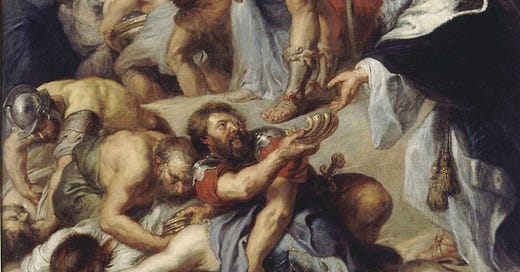






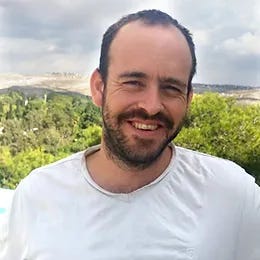
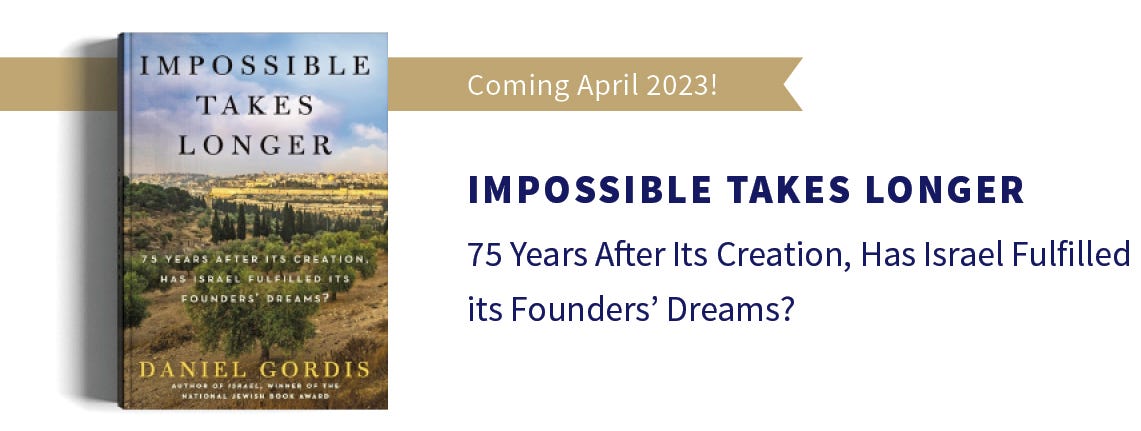






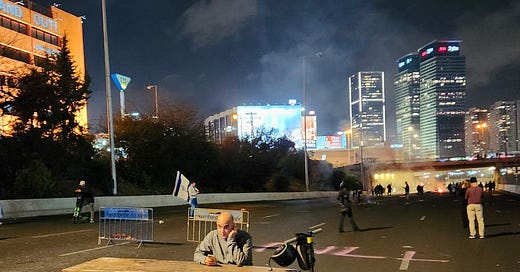

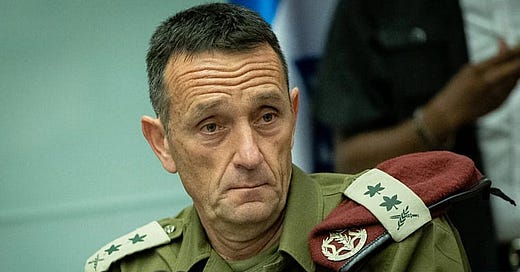



Beautifully written as usual. I recently reread Rabbi J Sack’s A Letter in the Scroll and highly recommend it to anyone. Does anyone know if it is translated into Hebrew? I would support a mass distribution of this book to the Jewish population looking for some clarity on what it means to “identify” Jewish independent of their level of observance.
Very well written, but with an issue. You haven't proposed what it is we seculars are supposed to take from both Jewish "religion" (I sort of agree that it's a civilizational culture broadly and shouldn't be compared to an imperial-confessional faith) and, most especially, from the blend of European and Islamic forms that religion officially takes in Israel. I have a fairly reasonable Jewish education myself, am adamantly pro-Zionist, would argue for a particularly Jewish Israel -- but I don't think "God said so as given to Moshe at Sinai then to ... Rav Ovadiyah Yosef then to Yitzhak Yosef" is a source of cultural authority or of culture, period. It is a claim of moral imperative by divine command. If I don't believe in any link in the chain, from Moshe at Sinai down to Rav Yosef - for instance if I am Ashkenazi! - then what am I or the State (which is neither Ashkenazi nor Sefaradi but *Jewish*) supposed to draw from it?